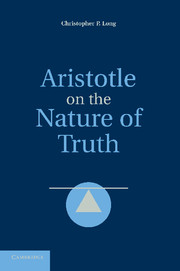Book contents
- Frontmatter
- Contents
- Prolegomenon
- Aristotle on the Nature of Truth
- 1 The Saying of Things
- 2 A History of Truth as Cor-respondence
- 3 Saving the Things Said
- 4 By Way of Address
- 5 By Way of Response
- 6 The Truth of Nature and the Nature of Truth in Aristotle
- 7 On Saying the Beautiful in Light of the Good
- 8 Ecological Justice and the Ethics of Truth
- Works Cited
- Index of Passages Cited
- General Index
6 - The Truth of Nature and the Nature of Truth in Aristotle
Published online by Cambridge University Press: 06 December 2010
- Frontmatter
- Contents
- Prolegomenon
- Aristotle on the Nature of Truth
- 1 The Saying of Things
- 2 A History of Truth as Cor-respondence
- 3 Saving the Things Said
- 4 By Way of Address
- 5 By Way of Response
- 6 The Truth of Nature and the Nature of Truth in Aristotle
- 7 On Saying the Beautiful in Light of the Good
- 8 Ecological Justice and the Ethics of Truth
- Works Cited
- Index of Passages Cited
- General Index
Summary
But truth is not ‘that which works’ but something in Nature that is worked with.
Frederick James Eugene Woodbridge, An Essay on NatureIn Aristotle, truth, like being, is said in many ways. A person is said to be “able to be true in life as well as in speech”; an inquiry is said to be oriented toward the “truth and nature of things”; and the mark of good action is said to be the truth that “stands in agreement with right desire.” Truth is also, of course, articulated in the things said themselves: it belongs to those declarative sayings that attempt to give voice to the truth by saying something of something, by combining and separating, affirming and denying; and truth is said not to be missed by those who “say something concerning nature,” for it is “as though they were compelled by the truth itself.” Truth is compelling and pervasive. The power of perceiving, when directed at what is proper to it, “is always true”; and while being appeared to and thinking things through can be true or false, for a certain thinking, “the true is to touch and to express” and there is no falsity, “but only ignorance and not touching.” The pervasive plurivocity of truth in Aristotle testifies to the manner in which the nature of truth grows in and through encounters with the nature of things. Aristotle articulates the nature of truth by attending to the truth of nature.
- Type
- Chapter
- Information
- Aristotle on the Nature of Truth , pp. 160 - 200Publisher: Cambridge University PressPrint publication year: 2010



